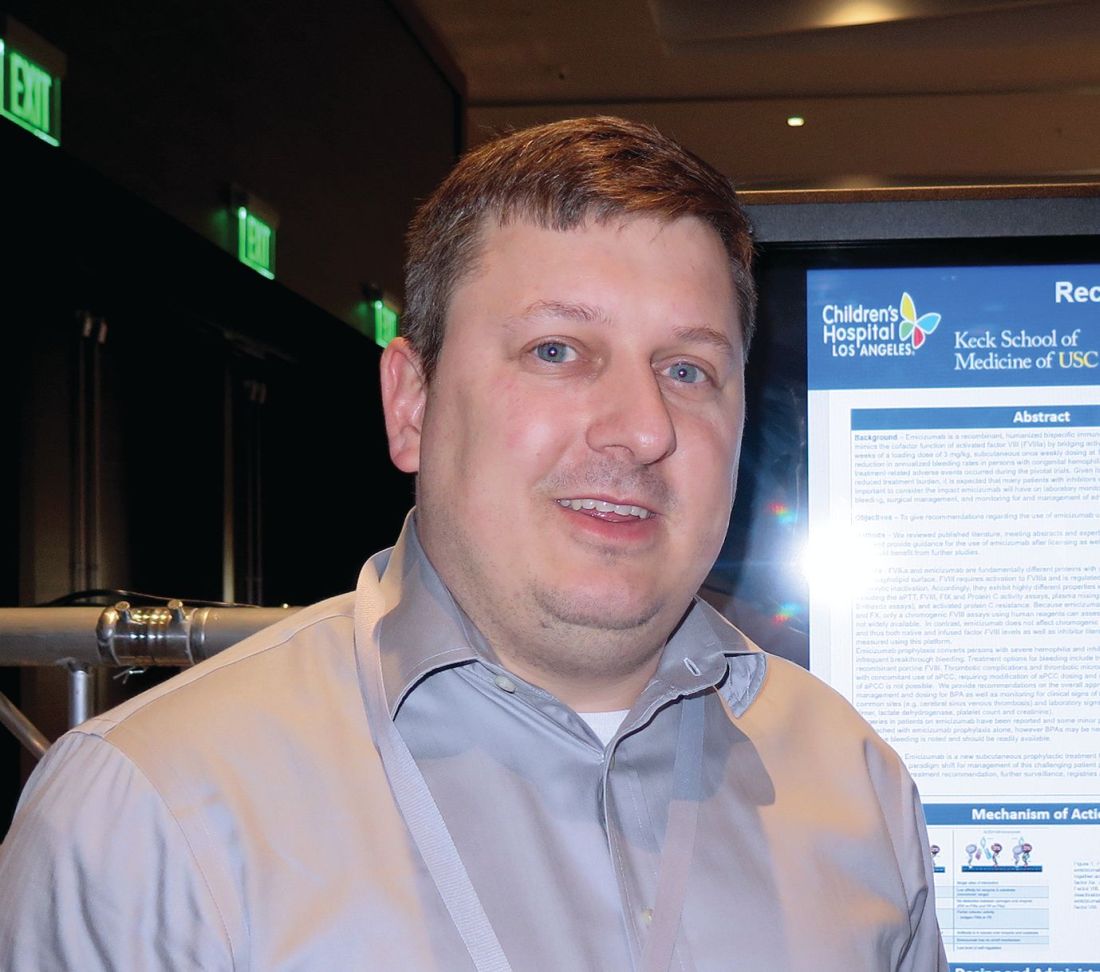User login
SAN DIEGO – Emicizumab is a safe and effective new therapy for individuals with hemophilia A and inhibitor antibodies that will likely provide a paradigm shift for managing this patient population, according to Michael U. Callaghan, MD.
“It’s a safe drug, but you do have to be cautious about treating breakthrough bleeds with activated prothrombin complex concentrate (aPCC) resistance in particular,” Dr. Callaghan, a pediatric hematologist/oncologist at Children’s Hospital of Michigan, Detroit, said in an interview at the biennial summit of the Thrombosis & Hemostasis Societies of North America. “Patients require laboratory monitoring, and you need to educate anyone who’s going to see the patient about how the drug affects laboratory tests.”
Approved in November 2017, emicizumab (Hemlibra) is a recombinant, humanized bispecific immunoglobulin G4 monoclonal antibody that mimics the cofactor function of activated factor VIII (FVIIIa) by bridging activated factor IX and factor X. After 4 weeks of a loading dose of 3 mg/kg, subcutaneous once weekly dosing at 1.5 mg/kg demonstrated significant reduction in annualized bleeding rates in patients of all ages with congenital hemophilia A and inhibitors. But treatment-related adverse events occurred during the pivotal trials.
In an effort to provide recommendations on use of emicizumab beyond information contained in the agent’s package insert, Dr. Callaghan and his associates reviewed published literature, meeting abstracts, and expert experience with emicizumab on clinical trials.
Since emicizumab is highly selective for human FIXa and FX, only chromogenic FVIII assays using human reagents can assess emicizumab activity but those assays are not widely available, the researchers noted in their abstract. “In contrast, emicizumab does not affect chromogenic assays that contain bovine reagents and thus both native and infused factor FVIII levels as well as inhibitor titers (modified Bethesda assay) can be measured using this platform.”
In a phase 3 trial of emicizumab known as HAVEN 1, serious adverse events included three cases of thrombotic microangiopathy (TMA) and two thrombotic events (TE) (N Engl J Med 2017;377:809-18).* To prevent breakthrough bleeding, aPCC should be avoided unless there are no effective alternatives to control bleeding, Dr. Callaghan said. Treatment options for bleeding include bypassing agents such as human or recombinant porcine FVIII.
To prevent, monitor, and treat TMA and TE, prior to starting emicizumab, patients should be informed that baseline hemostasis is increased with the agent and that there is an increased risk of pathologic thrombosis with bypassing agents.
Patients should also be informed about the risk of TE/TMA and the signs and symptoms of TE/TMA. “If repeated dosing of bypass agents is needed, particularly aPCC, patients should contact their hemophilia treatment center,” the researchers wrote. “If TE/TMA is suspected, platelet count, creatinine, d-dimer, and fibrinogen should be monitored. If TE/TMA occur, emicizumab should be held and aPCC discontinued until resolution. Upon resolution of TE/TMA, consideration should be given to restarting emicizumab on a case-by-case basis.”
As for laboratory considerations, the researchers noted that results of activated partial prothrombin time (aPTT) will be shortened in patients on emicizumab, often into the normal range even at low concentrations. In addition, one-stage aPTT based factor VIII activity assays will yield high factor VIII activities, even at low concentrations of the drug. “Health care providers including dentists, surgeons, and emergency room staff need to be informed of the effects of emicizumab on laboratory tests,” they wrote in a poster at THSNA 2018.
HAVEN 1 and HAVEN 2 showed that 22 patients underwent 29 surgical procedures: tooth extractions (6), CVAD procedures (9), and other procedures (14). Of the 29 surgical procedures, 9 (31%) were managed with prophylactic bypassing agents, and one treated bleed occurred. At the same time, 20 procedures (69%) were managed without prophylactic bypassing agents, and two treated bleeds occurred.
The researchers concluded that additional studies are needed to inform the use of emicizumab in people with hemophilia A, with and without inhibitor antibodies.
Dr. Callaghan reported having no financial disclosures.
*Correction, 4/26/2018: An earlier version of this story misstated the number of cases of thrombotic microangiopathy.
SAN DIEGO – Emicizumab is a safe and effective new therapy for individuals with hemophilia A and inhibitor antibodies that will likely provide a paradigm shift for managing this patient population, according to Michael U. Callaghan, MD.
“It’s a safe drug, but you do have to be cautious about treating breakthrough bleeds with activated prothrombin complex concentrate (aPCC) resistance in particular,” Dr. Callaghan, a pediatric hematologist/oncologist at Children’s Hospital of Michigan, Detroit, said in an interview at the biennial summit of the Thrombosis & Hemostasis Societies of North America. “Patients require laboratory monitoring, and you need to educate anyone who’s going to see the patient about how the drug affects laboratory tests.”
Approved in November 2017, emicizumab (Hemlibra) is a recombinant, humanized bispecific immunoglobulin G4 monoclonal antibody that mimics the cofactor function of activated factor VIII (FVIIIa) by bridging activated factor IX and factor X. After 4 weeks of a loading dose of 3 mg/kg, subcutaneous once weekly dosing at 1.5 mg/kg demonstrated significant reduction in annualized bleeding rates in patients of all ages with congenital hemophilia A and inhibitors. But treatment-related adverse events occurred during the pivotal trials.
In an effort to provide recommendations on use of emicizumab beyond information contained in the agent’s package insert, Dr. Callaghan and his associates reviewed published literature, meeting abstracts, and expert experience with emicizumab on clinical trials.
Since emicizumab is highly selective for human FIXa and FX, only chromogenic FVIII assays using human reagents can assess emicizumab activity but those assays are not widely available, the researchers noted in their abstract. “In contrast, emicizumab does not affect chromogenic assays that contain bovine reagents and thus both native and infused factor FVIII levels as well as inhibitor titers (modified Bethesda assay) can be measured using this platform.”
In a phase 3 trial of emicizumab known as HAVEN 1, serious adverse events included three cases of thrombotic microangiopathy (TMA) and two thrombotic events (TE) (N Engl J Med 2017;377:809-18).* To prevent breakthrough bleeding, aPCC should be avoided unless there are no effective alternatives to control bleeding, Dr. Callaghan said. Treatment options for bleeding include bypassing agents such as human or recombinant porcine FVIII.
To prevent, monitor, and treat TMA and TE, prior to starting emicizumab, patients should be informed that baseline hemostasis is increased with the agent and that there is an increased risk of pathologic thrombosis with bypassing agents.
Patients should also be informed about the risk of TE/TMA and the signs and symptoms of TE/TMA. “If repeated dosing of bypass agents is needed, particularly aPCC, patients should contact their hemophilia treatment center,” the researchers wrote. “If TE/TMA is suspected, platelet count, creatinine, d-dimer, and fibrinogen should be monitored. If TE/TMA occur, emicizumab should be held and aPCC discontinued until resolution. Upon resolution of TE/TMA, consideration should be given to restarting emicizumab on a case-by-case basis.”
As for laboratory considerations, the researchers noted that results of activated partial prothrombin time (aPTT) will be shortened in patients on emicizumab, often into the normal range even at low concentrations. In addition, one-stage aPTT based factor VIII activity assays will yield high factor VIII activities, even at low concentrations of the drug. “Health care providers including dentists, surgeons, and emergency room staff need to be informed of the effects of emicizumab on laboratory tests,” they wrote in a poster at THSNA 2018.
HAVEN 1 and HAVEN 2 showed that 22 patients underwent 29 surgical procedures: tooth extractions (6), CVAD procedures (9), and other procedures (14). Of the 29 surgical procedures, 9 (31%) were managed with prophylactic bypassing agents, and one treated bleed occurred. At the same time, 20 procedures (69%) were managed without prophylactic bypassing agents, and two treated bleeds occurred.
The researchers concluded that additional studies are needed to inform the use of emicizumab in people with hemophilia A, with and without inhibitor antibodies.
Dr. Callaghan reported having no financial disclosures.
*Correction, 4/26/2018: An earlier version of this story misstated the number of cases of thrombotic microangiopathy.
SAN DIEGO – Emicizumab is a safe and effective new therapy for individuals with hemophilia A and inhibitor antibodies that will likely provide a paradigm shift for managing this patient population, according to Michael U. Callaghan, MD.
“It’s a safe drug, but you do have to be cautious about treating breakthrough bleeds with activated prothrombin complex concentrate (aPCC) resistance in particular,” Dr. Callaghan, a pediatric hematologist/oncologist at Children’s Hospital of Michigan, Detroit, said in an interview at the biennial summit of the Thrombosis & Hemostasis Societies of North America. “Patients require laboratory monitoring, and you need to educate anyone who’s going to see the patient about how the drug affects laboratory tests.”
Approved in November 2017, emicizumab (Hemlibra) is a recombinant, humanized bispecific immunoglobulin G4 monoclonal antibody that mimics the cofactor function of activated factor VIII (FVIIIa) by bridging activated factor IX and factor X. After 4 weeks of a loading dose of 3 mg/kg, subcutaneous once weekly dosing at 1.5 mg/kg demonstrated significant reduction in annualized bleeding rates in patients of all ages with congenital hemophilia A and inhibitors. But treatment-related adverse events occurred during the pivotal trials.
In an effort to provide recommendations on use of emicizumab beyond information contained in the agent’s package insert, Dr. Callaghan and his associates reviewed published literature, meeting abstracts, and expert experience with emicizumab on clinical trials.
Since emicizumab is highly selective for human FIXa and FX, only chromogenic FVIII assays using human reagents can assess emicizumab activity but those assays are not widely available, the researchers noted in their abstract. “In contrast, emicizumab does not affect chromogenic assays that contain bovine reagents and thus both native and infused factor FVIII levels as well as inhibitor titers (modified Bethesda assay) can be measured using this platform.”
In a phase 3 trial of emicizumab known as HAVEN 1, serious adverse events included three cases of thrombotic microangiopathy (TMA) and two thrombotic events (TE) (N Engl J Med 2017;377:809-18).* To prevent breakthrough bleeding, aPCC should be avoided unless there are no effective alternatives to control bleeding, Dr. Callaghan said. Treatment options for bleeding include bypassing agents such as human or recombinant porcine FVIII.
To prevent, monitor, and treat TMA and TE, prior to starting emicizumab, patients should be informed that baseline hemostasis is increased with the agent and that there is an increased risk of pathologic thrombosis with bypassing agents.
Patients should also be informed about the risk of TE/TMA and the signs and symptoms of TE/TMA. “If repeated dosing of bypass agents is needed, particularly aPCC, patients should contact their hemophilia treatment center,” the researchers wrote. “If TE/TMA is suspected, platelet count, creatinine, d-dimer, and fibrinogen should be monitored. If TE/TMA occur, emicizumab should be held and aPCC discontinued until resolution. Upon resolution of TE/TMA, consideration should be given to restarting emicizumab on a case-by-case basis.”
As for laboratory considerations, the researchers noted that results of activated partial prothrombin time (aPTT) will be shortened in patients on emicizumab, often into the normal range even at low concentrations. In addition, one-stage aPTT based factor VIII activity assays will yield high factor VIII activities, even at low concentrations of the drug. “Health care providers including dentists, surgeons, and emergency room staff need to be informed of the effects of emicizumab on laboratory tests,” they wrote in a poster at THSNA 2018.
HAVEN 1 and HAVEN 2 showed that 22 patients underwent 29 surgical procedures: tooth extractions (6), CVAD procedures (9), and other procedures (14). Of the 29 surgical procedures, 9 (31%) were managed with prophylactic bypassing agents, and one treated bleed occurred. At the same time, 20 procedures (69%) were managed without prophylactic bypassing agents, and two treated bleeds occurred.
The researchers concluded that additional studies are needed to inform the use of emicizumab in people with hemophilia A, with and without inhibitor antibodies.
Dr. Callaghan reported having no financial disclosures.
*Correction, 4/26/2018: An earlier version of this story misstated the number of cases of thrombotic microangiopathy.
EXPERT ANALYSIS FROM THSNA 2018

